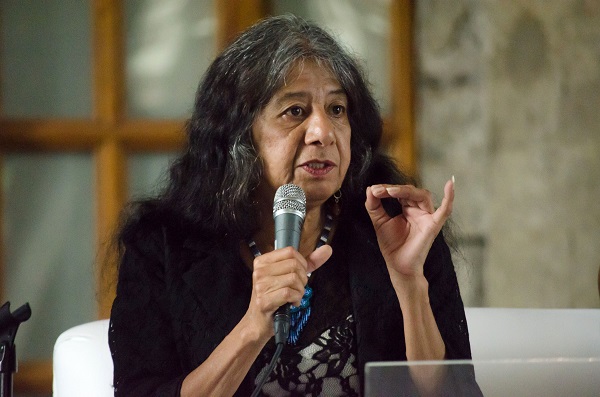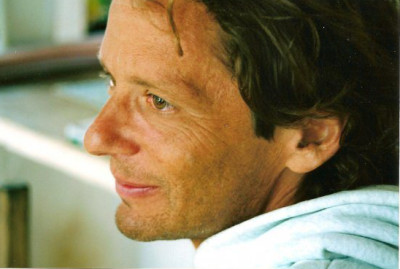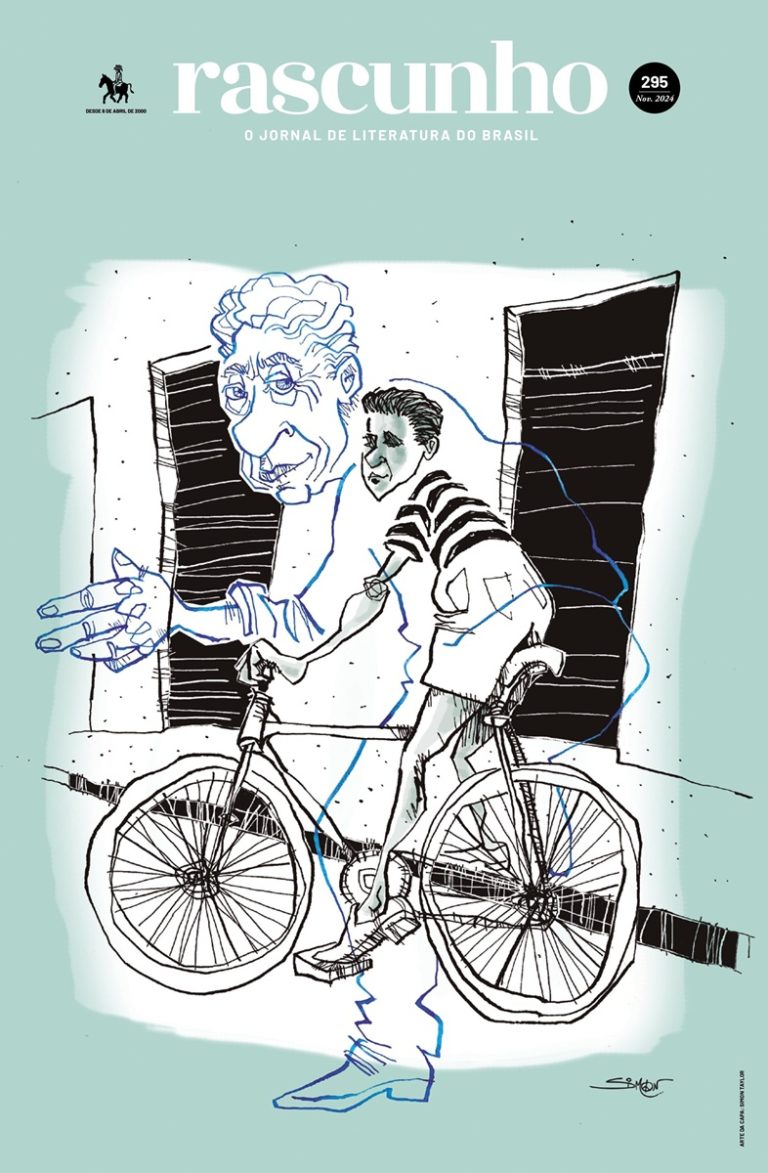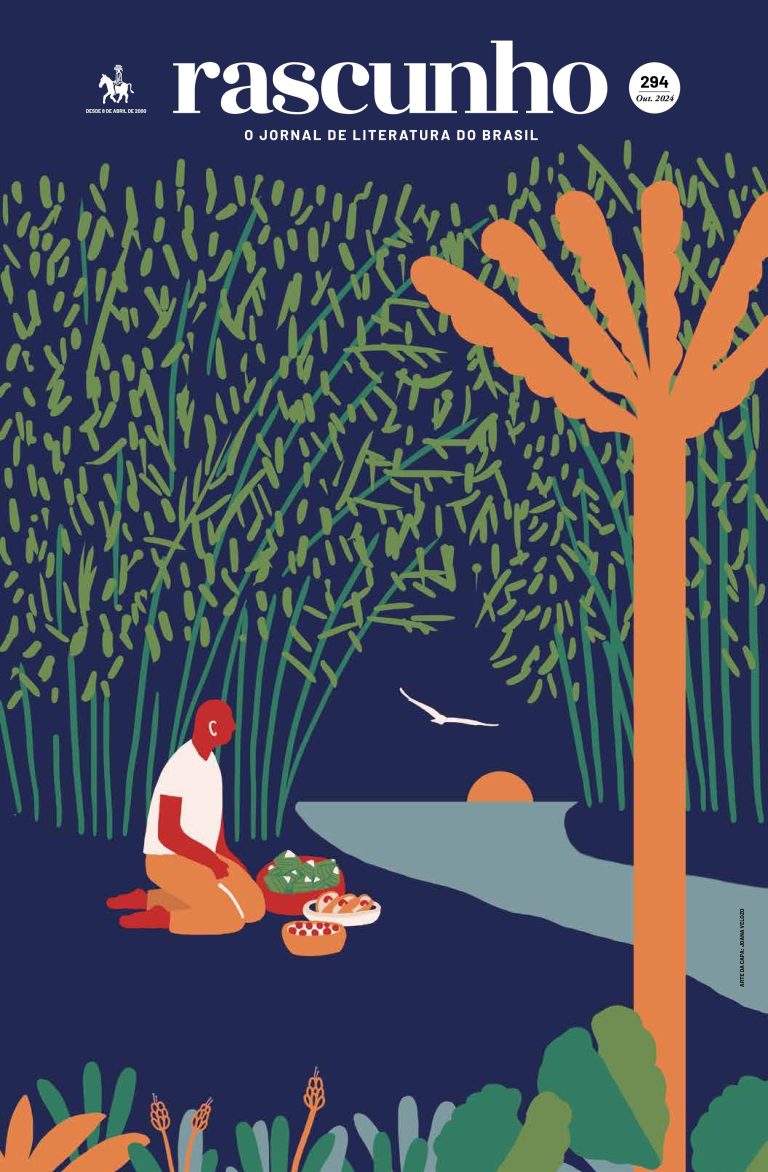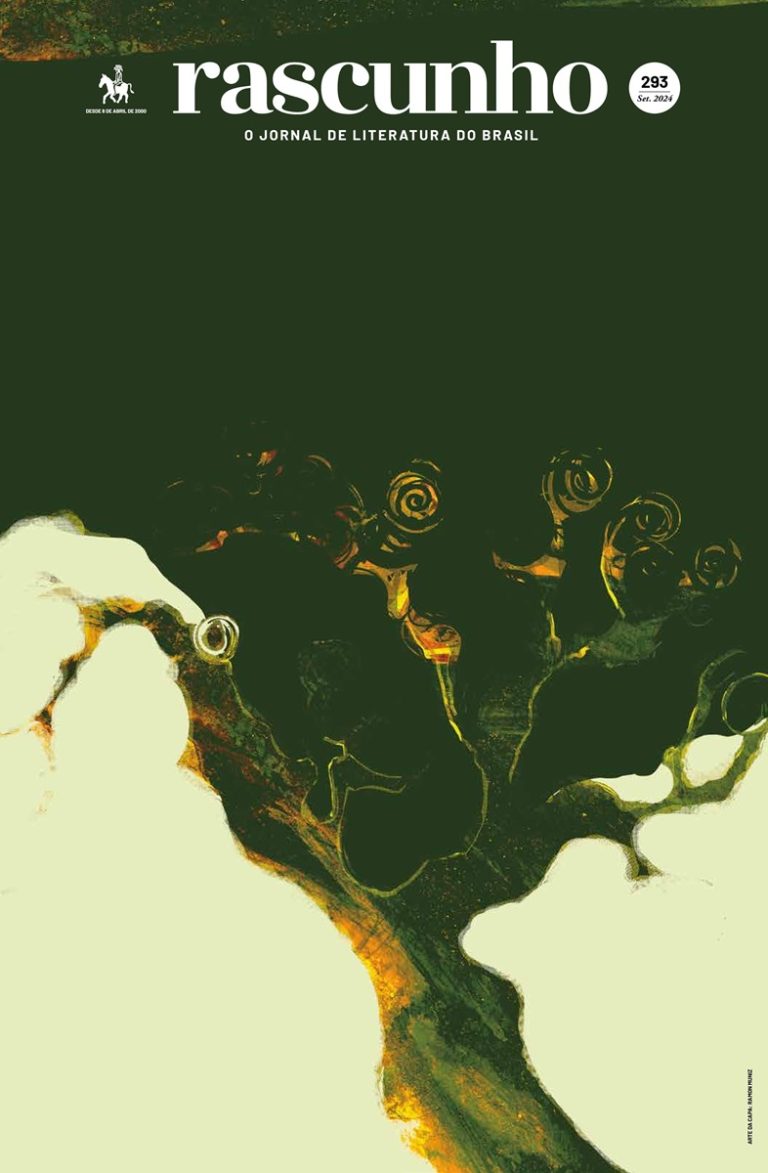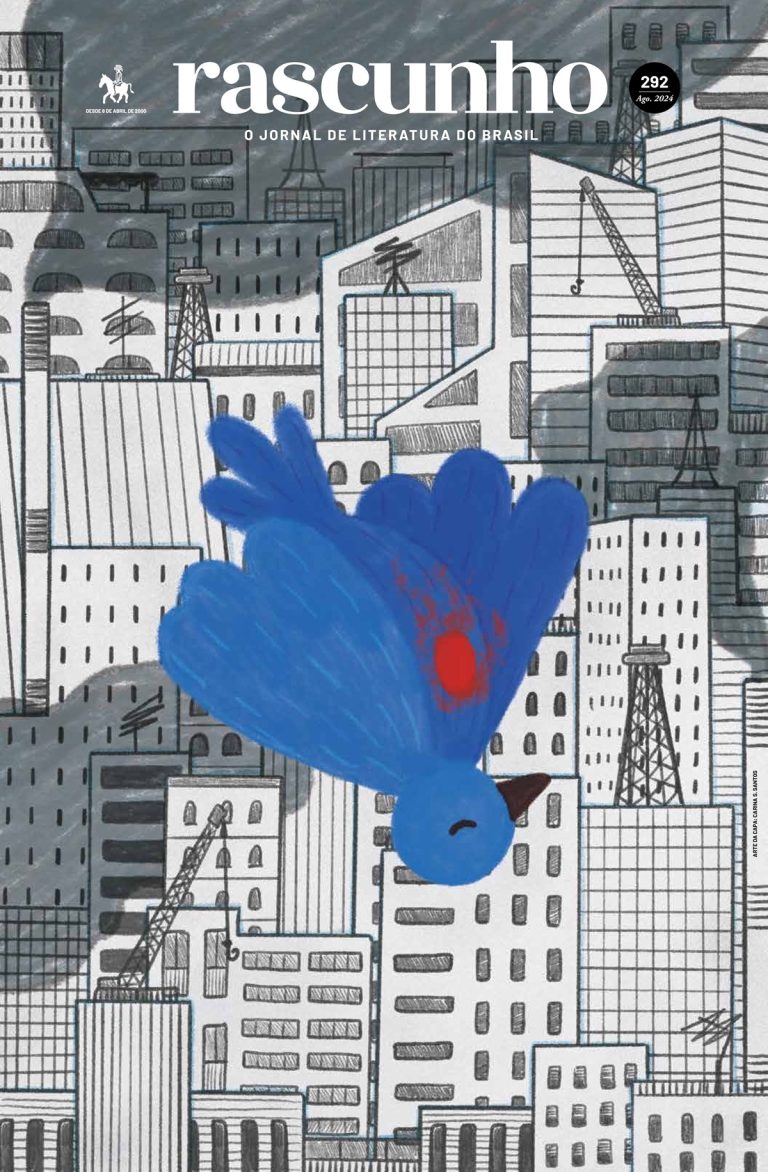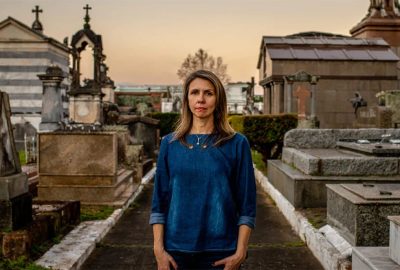Tradução e seleção: André Caramuru Aubert
Refugee Ship
Like wet cornstarch, I slide
past my grandmother’s eyes. Bible
at her side, she removes her glasses.
The pudding thickens.
Mama raised me without language.
I’m orphaned from my Spanish name.
The words are foreign, stumbling
on my tongue. I see in the mirror
my reflection: bronzed skin, black hair.
I feel I am a captive
aboard the refugee ship.
The ship that will never dock.
El barco que nunca atraca.
Barco de refugiados
Como amido de milho, eu deslizo
diante dos olhos de minha avó. A Bíblia
ao seu lado, ela tira os óculos.
O pudim engrossa.
Mamãe me criou sem uma língua.
Sou órfã do meu nome espanhol.
As palavras são estranhas, gaguejando
em minha língua. Vejo, no espelho,
minha imagem: pele bronzeada, cabelos negros.
Sinto que sou uma cativa
a bordo do barco de refugiados.
O barco que jamais atracará.
El barco que nunca atraca.
……….
The Prayer pressed between the waves
There’s sky and death
shimmering the waves.
He may never come back.
He may be forced to enter
the dumbness of tides,
he may swim, locked
in the freezing minutes
left him. But think
of her, mooning from her
widow’s roost, stunned while
sighting the horizon’s disarray.
She may hear the foreign tongue
the gulls speak, meddling, or
she may notice the silvery tern
buckle and dive, reentering
with something flashing in its beak.
And afterwards, she may never see
the world so flatly; the baby — a slice
of obsidian: blessed, iced, immovable.
A prece espremida entre as ondas
Há o céu e a morte
cintilando as ondas.
Ele pode jamais voltar.
Ele pode ser forçado a entrar
no tédio das marés,
ele pode nadar, preso
aos minutos congelantes que
lhe restam. Mas pense
nela, devaneando em seu
quarto de viúva, atordoado enquanto
observa o desalinho do horizonte.
Ela pode ouvir a língua estrangeira
que as gaivotas falam, se intrometendo, ou
ela pode reparar na andorinha-do-mar
se inclinar e mergulhar, regressando
com algo brilhante no bico.
E, depois, ela pode ser que jamais veja
o mundo de um jeito tão simples; o bebê — uma lasca
de obsidiana; abençoado, gelado, imóvel.
……….
Emplumada
When summer ended
the leaves of snapdragons withered
taking their shrill-colored mouths with them.
They were still, so quiet. They were
violet where umber now is. She hated
and she hated to see
them go. Flowers
born when the weather was good — this
she thinks of, watching the branch of peaches
daring their ways above the fence, and further,
two hummingbirds, hovering, stuck to each other,
arcing their bodies in grim determination
to find what is good, what is
given them to find. These are warriors
distancing themselves from history.
They find peace
in the way they contain the wind
and are gone.
Emplumada
Quando terminou o verão
as folhas das sempre-vivas murcharam
levando suas bocas estridentemente coloridas com elas.
Elas eram calmas, tão quietas. Elas eram
violeta onde agora há cinza. Ela odiou
e ela odiou vê-las
irem embora. Flores
nascidas quando o clima estava bom — é nisso
que ela pensa, olhando o galho de pêssegos
abrindo caminhos por sobre a cerca e, além,
dois beija-flores, pairando, ligados um no outro,
arqueando seus corpos em decidida resolução
de buscar o que vale a pena, o que é
dado a eles conseguir. Eles são guerreiros
distanciando-se da história.
Eles encontram paz
do jeito que retém o vento
e se foram.
……….
Freeway 280
Las casitas near the gray cannery,
nested amid wild abrazos of climbing roses
and man-high red geraniums
are gone now. The freeway conceals it
all beneath a raised scar.
But under the fake windsounds of the open lanes,
in the abandoned lots below, new grasses sprout,
wild mustard remembers, old gardens
come back stronger than they were,
trees have been left standing in their yards.
Albaricoqueros, cerezos, nogales…
Viejitas come here with paper bags to gather greens.
Espinaca, verdolagas, yerbabuena…
I scramble over the wire fence
that would have kept me out.
Once, I wanted out, wanted the rigid lanes
to take me to a place without sun,
without the smell of tomatoes burning
on swing shift in the greasy summer air.
Maybe it’s here
en los campos extraños de esta ciudad
where I’ll find it, that part of me
mown under
like a corpse
or a loose seed.
Autoestrada 280
Las casitas perto da cinzenta fábrica de enlatados,
aninhadas entre abrazos selvagens das roseiras
e os gerânios vermelhos da altura de uma pessoa
já ficaram para trás. A autoestrada esconde isso
tudo sob uma cicatriz que se ergue.
Mas sob os falsos sussurros das pistas abertas,
nos terrenos baldios abaixo, brotam capins renovados,
ervas daninhas se lembram, velhos jardins
retornam mais fortes do que eram,
árvores deixadas de pé nos seus quintais.
Albaricoqueros, cerezos, nogales…
Viejitas vêm aqui com sacolas de papel para catar verduras.
Espinaca, verdolagas, yerbabuena…
Escalo a cerca de arame que
deveria ter me mantido do lado de fora.
Houve um tempo em que eu queria ir embora, queria as pistas precisas
que me levariam a um lugar sem sol,
sem o cheiro dos tomates tostando
e dançando no ar oleoso do verão.
Quem sabe seja aqui
em los campos extraños de esta ciudad
onde encontrarei o que busco, aquela parte de mim
ceifada e enterrada
como um cadáver
ou uma semente que se perdeu.
……….
Her shallow grave
was sudden, was a forest of change,
not even a breathing apparatus in sight;
all the moon-struck streets emptied of Halloween,
a shroud of decency suspended in the wake.
Hers was a sudden sorrow. I walked
holes in my shoes, neglecting the birds, the
could-have-been-hers. All the wicked ways
summer can catch up with you again.
Remember the rain, heart. Be well
for winter.
Sua cova rasa
foi coisa repentina, uma floresta de mudanças,
nem sequer um aparelho de respiração por ali;
todas as ruas enluaradas vazias em Halloween,
uma mortalha de decência suspensa em vigília.
A dela foi tristeza repentina. Caminhei,
furos em meus sapatos, negligenciei os pássaros, os
poderiam-ter-sido-dela. Todas as maneiras perversas
com que o verão pode te pegar de novo.
Lembre-se da chuva, coração. Fique bem
no inverno.
……….
Possibilities — in 100 words
After I said I was going to “multiply the conditions
of possibility” and you said, “Okay. Good.” I knew it
was the wrong answer to the wrong question. And afterwards,
every hummingbird was you. A murder of crows on my
elm tree became you finally calling my number, a slumber
of vultures circling my apartment, a single red fox roaming
my neighborhood, beat up, but there; a leftover garden
in a place someone is leaving: hard red pots left over
in the move. After I said, “I love you,” you
could have hammered me over the heart with the silence.
Possibilidades — em 100 palavras
Depois que eu disse que iria “multiplicar as condições
do que é possível,” e você disse, “Certo. Bom.” Eu soube que
aquela era a resposta errada para a pergunta errada. E, depois,
cada beija-flor era você. Uma matança de corvos em
meu olmo se tornou você até que enfim me telefonando, urubus
preguiçosos voando em círculos sobre meu apartamento; uma solitária
raposa-vermelha rondando pelo bairro, machucada, mas resistindo; restos
de um jardim de uma casa sendo deixada: potes vermelhos ficaran para trás
na mudança. Depois que eu disse “eu te amo,” você
poderia ter me martelado o coração com o silêncio.

